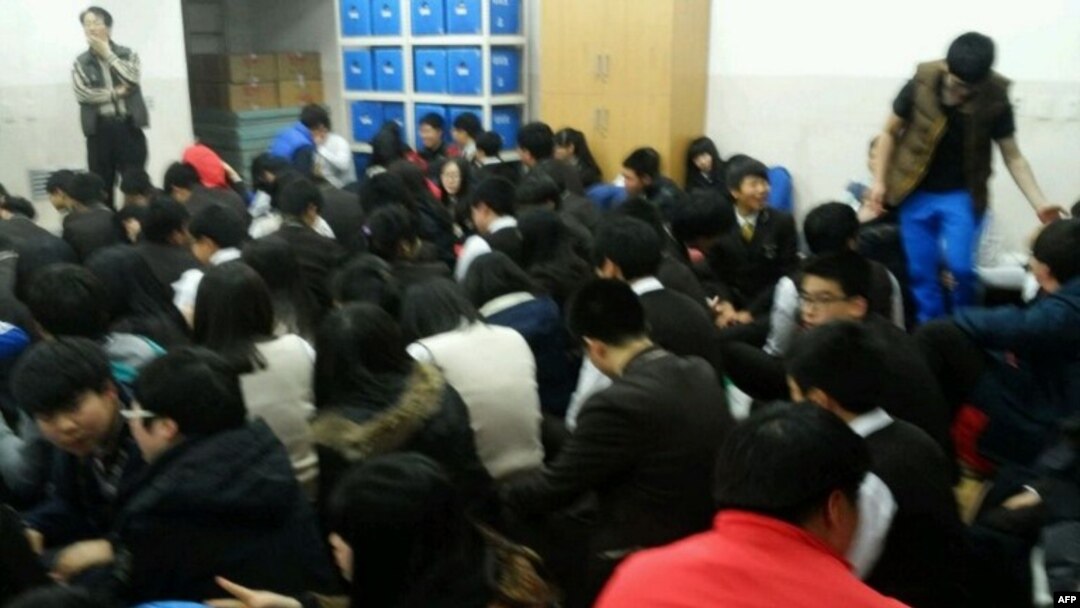HONG KONG —
China is calling for calm in the Korean Peninsula after North Korea fired artillery near the South’s maritime border, and Seoul responded by firing back.
Pyongyang notified Seoul of its plans to conduct live-fire drills and then fired shells in waters that belong to South Korea, said South Korea's Defense Ministry spokesman Kim Min-seok. He called the action a planned provocation by the North aimed at testing the South's willingness to protect its water boundaries.
Kim said the South, which responded by firing about 300 shells, intended to firmly punish North Korea for the infraction.
As a precaution, South Korean authorities moved residents of the nearby islands into shelters.
The firing lasted hours, and happened in waters close to North Korea's western shores, where the boundaries between the two countries are contested.
North Korea does not recognize the “Northern Limit Line,” which was drawn in the 1950s and includes a number of islands physically closer to North Korea that are designated as South Korean territory.
North Korea's sole ally in the region, China, called for calm and restraint.
In Beijing, Foreign ministry spokesman Hong Lei said China is concerned about the rising temperature on the Korean peninsula. He called on all sides to remain calm and not do anything to worsen tensions.
Beijing has repeatedly stated its concern about spikes in tensions that could endanger stability in the region.
China traditionally sides with the United Nations in condemning provocative acts by the North, including the launch of missiles and developments in Pyongyang's nuclear weapon program.
But Beijing has fallen short of singling out the North, and says all parties involved have a responsibility to tone down their actions.
Cheng Xiaohe, a professor of international relations at Renmin University in Beijing says that in incidents such as Monday's exchange of fire there is not much China can do.
"The actions are not directly targeting China, but might hamper something that China has pushed for a long time: the resumption of the six-party talks," Cheng said.
The talks are a series of multilateral negotiations that stalled in 2009, after North Korea had already agreed to abandon its nuclear program in exchange for aid and security guarantees.
Apart from the two Koreas, China, the U.S. and Russia, the six-party talks also include Japan.
Pyongyang notified Seoul of its plans to conduct live-fire drills and then fired shells in waters that belong to South Korea, said South Korea's Defense Ministry spokesman Kim Min-seok. He called the action a planned provocation by the North aimed at testing the South's willingness to protect its water boundaries.
Kim said the South, which responded by firing about 300 shells, intended to firmly punish North Korea for the infraction.
As a precaution, South Korean authorities moved residents of the nearby islands into shelters.
The firing lasted hours, and happened in waters close to North Korea's western shores, where the boundaries between the two countries are contested.
North Korea does not recognize the “Northern Limit Line,” which was drawn in the 1950s and includes a number of islands physically closer to North Korea that are designated as South Korean territory.
North Korea's sole ally in the region, China, called for calm and restraint.
In Beijing, Foreign ministry spokesman Hong Lei said China is concerned about the rising temperature on the Korean peninsula. He called on all sides to remain calm and not do anything to worsen tensions.
Beijing has repeatedly stated its concern about spikes in tensions that could endanger stability in the region.
China traditionally sides with the United Nations in condemning provocative acts by the North, including the launch of missiles and developments in Pyongyang's nuclear weapon program.
But Beijing has fallen short of singling out the North, and says all parties involved have a responsibility to tone down their actions.
Cheng Xiaohe, a professor of international relations at Renmin University in Beijing says that in incidents such as Monday's exchange of fire there is not much China can do.
"The actions are not directly targeting China, but might hamper something that China has pushed for a long time: the resumption of the six-party talks," Cheng said.
The talks are a series of multilateral negotiations that stalled in 2009, after North Korea had already agreed to abandon its nuclear program in exchange for aid and security guarantees.
Apart from the two Koreas, China, the U.S. and Russia, the six-party talks also include Japan.


